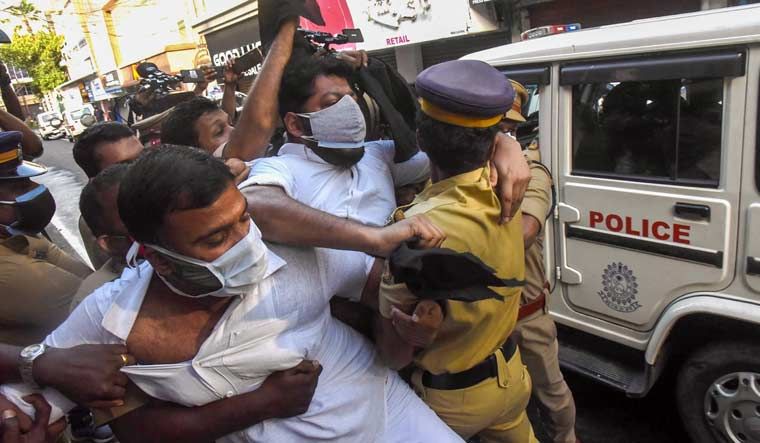
Lakshadweep admin a gulf away from SC-appointed panel recommendations

The Lakshadweep Administration’s draft proposal for the formation of a development authority and the executive order transferring powers from panchayat, the proposed water villa projects and the marine park go in direct contradiction with the recommendations of the Justice Ravindran Committee appointed by the Supreme Court in 2012.
Any development activity in the island can be done only under the provisions of the ‘Integrated Island Management Plan’ according to the Island Protection Zone (IPZ) notification of 2011. S Asker Ali, the collector of Lakshadweep, announced that the administration is in the process of planning a bunch of tourism projects in collaboration with NITI Aayog, with an objective to transform Lakshadweep into the Maldives to make it one of the major tourist destinations in the world.
The establishment of town planning authority and smart city projects in four of the 10 islands that have human inhabitation as announced by the administration also go against the recommendations of the Justice Ravindran Committee as well as the rules framed by the Island Protection Zone notification.
Also read: Regulations can’t be rolled back, asserts Lakshadweep Administrator
Justice Ravindran Committee
The Supreme Court-appointed Justice R.V. Ravindran, a former judge of the apex court, to look into the environmental and developmental challenges in the island as part of a judgment in the case involving the Union Territory of Lakshadweep versus Seashells Beach Resort and Others. According to the gazette notification dated July 18, 2018, the Lakshadweep Administration is obliged to follow the Integrated Island Management Plan evaluated and authorized by a five-member committee appointed by the Supreme Court.
One of the major recommendations of the committee is that all development projects envisaged in the Integrated Development Plan will be implemented in consultation with the elected local self-government bodies. “Considering the fragile ecosystem, all forms of development by government or otherwise (except any guarded development for carefully predetermined operational constructions), shall uniformly adhere to the IIMPs,” said the report.
Preservation of ecosystems
The committee emphasized that the sensitization of officials and education of the islanders to create awareness about the fragile ecology of the islands and the need for conservation of the corals, lagoons and other eco-systems should be taken up on priority.
The report states that “as a part of such education/sensitization, there should be an emphasis on the need for reduction of fuel-consuming polluting motor vehicles, conservation of water and energy, creation of non-polluting alternative sources of energy, and creation of efficient non-polluting sewage disposal”.
Also read: Administrator’s laws put Lakshadweep in the middle of nowhere
The islanders argue that the recently introduced development proposals, including the road widening project, go in blatant violation of these recommendations. The committee strictly proposed a strict ban on dredging, sand mining and construction of breakwaters in order to protect lagoons, corals, seagrass and other ecosystems.
According to the commission any development activity, including that of tourism, should comply with the same. The committee had also recommended that any tourism project could be done in the uninhabited islands only. Private resorts can be allowed in uninhabited islands, but only in limited numbers so that the number of tourists should never exceed the permitted limit.
The committee has also instructed carrying out periodical mapping of corals, seagrass and rare endangered organisms (to be done every five years).
Also read: Will Lakshadweep’s mid-day meal menu turn vegetarian under Akshaya Patra?
The proposed projects by the island administration give little regard to all these recommendations. The process of establishing a marine park in ‘Suheli’ one of the uninhabited islands, which is home to an extensive lagoon ecosystem, is in progress. Sources said NITI Aayog has successfully overcome the objections of expert members in Lakshadweep Coastal Management Authority holding on to the majority view.
“It’s the biodiversity hub supporting the fishery of the Lakshadweep waters. The process of declaring this as a marine park by the Lakshadweep environment department is in an advanced stage. The NITI Aayog wanted this to be made a major tourism area with huts in lagoon and beach with recreational activities as speed boating, diving, snorkeling and game fishing.”
The draft IIMP for Lakshadweep was prepared by National Centre for Earth Science Studies (NCESS). K.V. Thomas, scientist and former head of the coastal process group with the NCESS told The Federal: “They could even get certain provisions to sustain the unique island ecosystem in the approved Integrated Island Management Plan.” He also said that the government manages to get environment impact assessment reports as they wish.
“Unfortunately, well-known scientists and technologists of well-known institutions associate themselves with the preparation of EIA reports and supporting documents. This story is the same with many other projects in ecologically sensitive areas in the country,” said Dr. Thomas.
Talking to The Federal, S. Faizi, an ecologist and UN multilateral negotiator, said the Administrator’s designs amount to a glaring violation of the International Declaration on the Rights of Indigenous Peoples, adopted by the UN General Assembly and endorsed by India.
“Given the outstanding marine ecological features of the archipelago and the unique culture of the tribal community, the Lakshadweep ecological complex ought to be declared as a Unesco World Heritage Site or a Unesco Man and Biosphere Reserve,” Dr. Faizi said.


